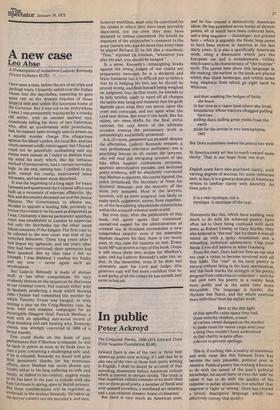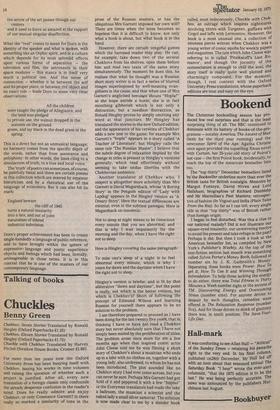In public
Peter Ackroyd
The Collected Poems, 1956-1974 Edward Dorn (Four Seasons Foundation $5.00)
Edward Dorn is one of the two or three best American poets now writing; if I add that he is also one of the two or three best poets writing in English, I shall no doubt be accused of that snivelling abasement before American culture which is current in certain circles. The truth is that American culture consists of no more than two or three good poets, a number of florid and over-praised novelists, a moribund art industry and a non-existent theatre. Some civilisation.
But Dorn is very much an American poet, and he has created a distinctively American idiom. He has published seven books of shorter poems, all of which have been collected here, and a long sequence — Gunslinger, not printed here — which is arguably the finest long poem to have been written in America in the last thirty years. It is also a specifically American work, using a dissonance which jars the European ear and a melodramatic virility which used to be characteristic of "the frontier" myth. The poems here show this language in the making; the earliest in the book are placed within that blank landscape, and within some long, emphatic lines which go right back to Whitman:
and dust masking the hedges of fields she knew in her eyes as a vague land where she lived, boundaries, whose tractors chugged pulling harrows pulling discs, pulling great yields from the earth pulse for the armies in two hemispheres, 1943 But Dorn sometimes makes his points too well: In America every art has to reach toward some clarity. That is our hope from the start.
English poets have also practised clarity, with varying degrees of success, for some centuries now; in fact, it is a general mistake of American writers to confuse clarity with sincerity. As Dorn puts it: It is a real mystique, not a mystique. A mystique of the real.
Statements like this, which have nothing very much to do with his achieved poetry, have often led to Dorn being confused with such poets as Robert Creeley or Gary Snyder; they also believed in "the real" but for them it was all mixed up with a tacky orientalism and a wheedling, hysterical adolescence. Clap your hands if you still believe in Allen Ginsberg.
From the start, Dorn had too firm an ear and too clear a vision to become involved with all that fiddle. The "real" in his early poetry is natural without being in the least sentimental, and this book marks the strength of his poetic/ progress from collection to collection — until he can now turn his poetry to a reality both more public and at the same time more intractable. The language is harder, the rhythms less fluent, and the whole exercise more individual than his earlier work:
Bent in the dim light . of that specific cabin space they had, those unlucky children, a meal of various cereal dumped on the market to make room for vaster crops next year a thing they couldn't have understood or that charity is quite often a device to prevent spoilage.
This is, if nothing else, a poetry of statement and with verse like this Edward Dorn has become the only plausible, political poet in America. Political poetry has nothing whatever to do with the extent of the poet's political knowledge, his savoir faire, or even the 'side' he takes; it has to do with the quality of his response to public situations, not whether that response is 'right' or 'wrong'. Dorn has created a lyrical, descriptive language which can effectively convey that quality:
the arrow of the art passes though our centers and it used to leave us amazed at the rapport of our mutual singular disaffection.
What the "real" comes to mean for Dorn is the identity of the speaker and what is spoken, with something like an Orphic spirit, and in a culture which depends for its most splendid effects upon various forms of separation — the television and film, the astronauts in their space modules — this stance is in itself very much a political one. And this sense of connection — whether it be between the self and its proper place, or between the object and its exact role — leads Dorn to some very clear observations: All the children were taught the pledge of Allegiance, and the land was pledged to private use, the walnut dropped in the autumn on the ground green, and lay black in the dead grass in the spring.
This is a direct but not an unmusical language; its harmony comes from the specific depth of the words, rather than from assonance and polyphony: in other words, the lines cling to a simulacrum of truth, to a true and local voice.
The 'truth' of poetry can sometimes, of course, be painfully banal and there are certain poems in this eollection which are marred by amateur historicism and by a rhetorical use of the language of economics. But it can also hit its mark: England beware the cliff of 1945 turns a natural insularity into a late, and out of joint naturalism of inbred industrial indecision.
Dorn's proper achievement has been to create single-handedly a language of public reference, and to have brought within the sphere of expressive. language and poetic experience objects and feelings which had been, literally, unimaginable in those terms. It is in this context that he is one of the masters of our contemporary language.
Talking of books



























 Previous page
Previous page